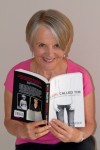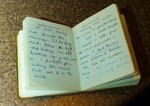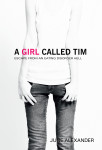Diary writing – a tool for healing and self-renewal
Diary writing – a tool for healing and self-renewal

‘A Girl Called Tim’ is my story of living with, and breaking free from, an eating disorder. To order a copy, click here.
The Christmas gift of a small, pale green, soft-covered, day-to-a-page diary was the best thing that happened to me in 1962. Early that

My first of more than 50 diaries – from as early as I can remember, words have been my friends. The gift of a diary in 1962 began a ‘love affair’ that has survived more than 50 years and has helped me to not only survive but break free of my eating disorder.
year I had developed Anorexia Nervosa.
I developed Anorexia at age 11, at a time when mental illness was an embarrassment and family-based therapy and multi-family based therapy were unheard of. The effect on my family – my parents, my sister and me – was bad enough then but would become worse as years passed. We know now that denying there is an eating disorder in the family is about the worst thing you can do, because in many ways this is a family illness and when treatment is sought, for the best outcome, every member of the family needs to be involved in the process. Of course, none of that was even thought of back in 1962, and as I was developing a tag of being ‘the one with problems in the family’, that peaceful little diary looked mighty good to me. Non-judgemental, 365 empty pages just waiting for me to write on, and all mine. The diary and I bonded immediately and New Year couldn’t come soon enough. On January 1st, I noted the Australian Test Cricket score; the number of calories consumed that day, and the amount of hours walked. As years rolled by, the diary increasingly became a confidante and comfort when feeling misunderstood.
Through adolescence, young adulthood, school, career and parenthood, it chronicled an almost complete loss of self and then became a survival tool, helping to rebuild and rediscover the real me. Eventually it would be come the major source of my memoir, A Girl Called Tim.
From the preface of my eating disorder memoir, A Girl Called Tim:
This memoir is about a journey of more than 40 years with two eating disorders.
I was 11 years old, in Grade Six at primary school, when I developed a mental illness called anorexia nervosa. It starved my body and I became emaciated. Eventually I gained weight and everyone, including me, thought I was well again. But anorexia hid inside my brain, and continued to sabotage my mental and emotional health.
My memoir is written almost entirely from my diaries, which I began writing at the age of 12. The process of diary writing was important for, although not aware of this at the time, it helped me stay alive. Many years on, when I summoned the courage to read my journals, I was rewarded with a heightened understanding of self, of the influences and environment that shaped my childhood. This was liberating in moving forward with my present. For decades my life had seemed like a jigsaw puzzle – there were pieces missing. I had gaping holes within. My diary contained clues to help heal and fill those gaps.
Isolated by my illness, my diary was frequently my only friend, my only link with a tiny thread of self. Often, tears soaked the page as I off-loaded loneliness, despair, alienation and rejection. Other times, my writing ran crookedly over the page, thoughts spilling haphazardly out of a mind numb from bingeing or heavily dosed with prescription drugs.
My love of the written word began when I was three. My earliest memory is of sitting cross-legged on the linoleum-covered kitchen floor, turning the pages of the daily newspaper and thinking: ‘When I grow up I will read every word on every page’. Even the tiny print in the Birth and Death columns. Words were fascinating. They were full of promise and possibilities. They could describe and express, reveal and reflect.
Their shape, their look, big words, little words, the way they could mix and match to mean and convey different things – was mesmerising. They were friendly. Above all, they were an escape from the outside world. They connected with me and when I wrote them, they belonged to me.
When given a small, soft, covered diary for my 12th birthday, the little book quickly became my best friend.
Initially, entries were mostly matter-of-fact observations. I went to school at this time and came home at that time. Expressions of emotion— happy or sad—were rare. As our relationship grew, I began to share my heart and soul.
Reading my diaries, from age 12 to 55, in preparation to write ‘A Girl Called Tim’ was cathartic and often scary.
I felt I was tumbling back in time, re-living an arduous journey to regain my life and be ‘normal’. I felt I was climbing my mountain all over again. And indeed I was – this time, to freedom.
Almost a year had passed since I developed anorexia when I wrote my first diary entry on January 1,Tuesday, 1963:
Woke up at 5 o’clock. Had breakfast at ¼ past 7. I had 1 round of toast + 3 bits of meat ….
Fifty years on, the diary remains a best friend and I am excited that evidence-based research is starting to focus on what I have learnt through experience: that the process of writing, combined with daily reflection and analysis, can provide a platform for healing, recovery and self-renewal.
* If you suspect an eating disorder is affecting you or a member of your family, seek help straightaway. Don’t delay. An eating disorder is an illness. Reach out today.






